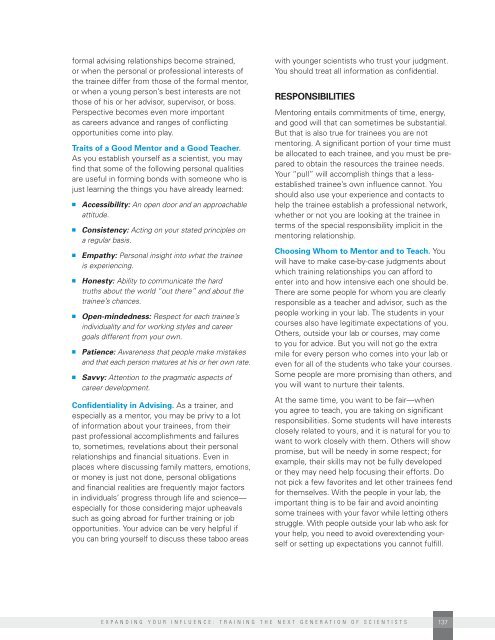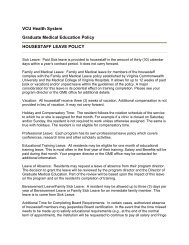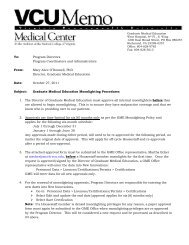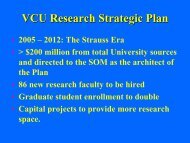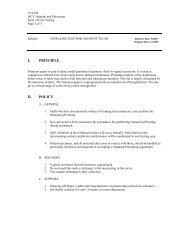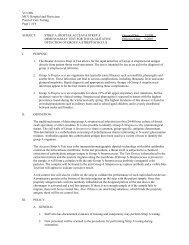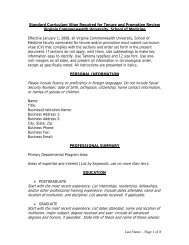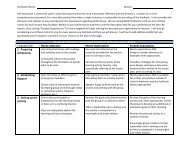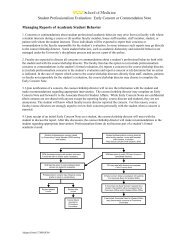increase your impact as a scientist. By helpingthose around you succeed, by ensuring that peoplein your laboratory and in your larger circle feelcompetent and included, by motivating them to beproductive, you are ensuring the success <strong>of</strong> yourown research program.As the people you are training and encouragingembark upon new projects <strong>of</strong> their own, you willnaturally be kept abreast <strong>of</strong> the latest scientificdevelopments in the areas that interest them. Andwhen people in your lab, or others with whom youhave this special relationship, establish independentcareers <strong>of</strong> their own, their achievements asindependent scientists will reflect positively onyou. Also, the people you train and encourage willbecome potential collaborators and colleagueswho may continue to confide in you and bring youinto their own growing spheres. That will comeabout both informally and formally as they inviteyou to give talks at their institutions and participatein the conferences they will someday organize.As the head <strong>of</strong> a laboratory, you will probably hiretechnicians, perhaps assume responsibility for thedirection <strong>of</strong> graduate students, and take on a fewscientists who want to train in your lab. If you areat a university where undergraduate students areexpected to do laboratory research, you may havea few <strong>of</strong> them in your lab as well. It is also possiblethat young scientists outside your lab maybegin knocking on your door, especially if you haveexpertise in an area most people are not familiarwith. Within your research community and yourgeographic region, you will increasingly be seen asthe expert in your area <strong>of</strong> interest.It is natural that people will come to you for insightand advice about their own scientific interests.At the same time, you will continue to be in need<strong>of</strong> guidance for your own continuing pr<strong>of</strong>essionaldevelopment, and like those who seek your help,you will be looking to more experienced peoplefor insight and advice. This chapter describes theprocess <strong>of</strong> providing the very hands-on training <strong>of</strong>an individual scientist, with a focus on preparingthe people working in your lab. It also suggestsdesirable personal qualities and plans <strong>of</strong> actionfor trainers, mentors and trainees. (Note: In thischapter, the people you train are referred to as“trainees,” although not everyone you encourageor educate may be receiving training in your lab,and not everyone you train will become a protégé.)What is Mentoring?Scientific training is most <strong>of</strong>ten a personal, oneon-onerelationship between a more experiencedscientist and a junior scientist or a scientist-inthe-making.But it can also be between peers,one <strong>of</strong> whom is entering a new field and anotherwho knows that field well. The trainer is exposedto the trainee’s energy, curiosity, and ideas, andthe trainee receives the guidance and encouragementnecessary for pr<strong>of</strong>essional development.Mentoring and training relationships commonlyform across broad experience gaps—e.g.,pr<strong>of</strong>essor to student, but also can be establishedbetween junior and senior students, or betweenpeers or near peers. For example, a graduatestudent whose background is in biology may takea mentoring role for a graduate student whosebackground is in mathematics, or a graduatestudent may become a mentor to an undergraduatewho shares his or her scientific interests.Mentors sometimes include those who are <strong>of</strong>ficiallyresponsible for the work <strong>of</strong> junior scientistsor students, such as the head <strong>of</strong> a laboratory or aformal advisor (in some places such formal headsare referred to as mentors no matter how deeptheir commitment to training a given individual).The depth <strong>of</strong> a senior scientist’s involvement andinterest in a trainee’s career and work may belimited, especially when there are many peoplebeing trained or in cultures where there are strictlimits on personal contact between pr<strong>of</strong>essorsand those whom they teach.However, it is also important to have mentors,advisors, and trainers who are outside the directline <strong>of</strong> authority, or even outside the trainee’sprimary area <strong>of</strong> interest, because those who arefurther removed from the student’s interest mayask questions that will help the trainee movealong better than those who share most <strong>of</strong> thestudent’s assumptions. Mentors who have somedistance—and therefore good perspective—canbe especially helpful in providing guidance when136 excellence everywhere
formal advising relationships become strained,or when the personal or pr<strong>of</strong>essional interests <strong>of</strong>the trainee differ from those <strong>of</strong> the formal mentor,or when a young person’s best interests are notthose <strong>of</strong> his or her advisor, supervisor, or boss.Perspective becomes even more importantas careers advance and ranges <strong>of</strong> conflictingopportunities come into play.Traits <strong>of</strong> a Good Mentor and a Good Teacher.As you establish yourself as a scientist, you mayfind that some <strong>of</strong> the following personal qualitiesare useful in forming bonds with someone who isjust learning the things you have already learned:n Accessibility: An open door and an approachableattitude.n Consistency: Acting on your stated principles ona regular basis.n Empathy: Personal insight into what the traineeis experiencing.n Honesty: Ability to communicate the hardtruths about the world “out there” and about thetrainee’s chances.n Open-mindedness: Respect for each trainee’sindividuality and for working styles and careergoals different from your own.n Patience: Awareness that people make mistakesand that each person matures at his or her own rate.n Savvy: Attention to the pragmatic aspects <strong>of</strong>career development.Confidentiality in Advising. As a trainer, andespecially as a mentor, you may be privy to a lot<strong>of</strong> information about your trainees, from theirpast pr<strong>of</strong>essional accomplishments and failuresto, sometimes, revelations about their personalrelationships and financial situations. Even inplaces where discussing family matters, emotions,or money is just not done, personal obligationsand financial realities are frequently major factorsin individuals’ progress through life and science—especially for those considering major upheavalssuch as going abroad for further training or jobopportunities. Your advice can be very helpful ifyou can bring yourself to discuss these taboo areaswith younger scientists who trust your judgment.You should treat all information as confidential.ResponsibilitiesMentoring entails commitments <strong>of</strong> time, energy,and good will that can sometimes be substantial.But that is also true for trainees you are notmentoring. A significant portion <strong>of</strong> your time mustbe allocated to each trainee, and you must be preparedto obtain the resources the trainee needs.Your “pull” will accomplish things that a lessestablishedtrainee’s own influence cannot. Youshould also use your experience and contacts tohelp the trainee establish a pr<strong>of</strong>essional network,whether or not you are looking at the trainee interms <strong>of</strong> the special responsibility implicit in thementoring relationship.Choosing Whom to Mentor and to Teach. Youwill have to make case-by-case judgments aboutwhich training relationships you can afford toenter into and how intensive each one should be.There are some people for whom you are clearlyresponsible as a teacher and advisor, such as thepeople working in your lab. The students in yourcourses also have legitimate expectations <strong>of</strong> you.Others, outside your lab or courses, may cometo you for advice. But you will not go the extramile for every person who comes into your lab oreven for all <strong>of</strong> the students who take your courses.Some people are more promising than others, andyou will want to nurture their talents.At the same time, you want to be fair—whenyou agree to teach, you are taking on significantresponsibilities. Some students will have interestsclosely related to yours, and it is natural for you towant to work closely with them. Others will showpromise, but will be needy in some respect; forexample, their skills may not be fully developedor they may need help focusing their efforts. Donot pick a few favorites and let other trainees fendfor themselves. With the people in your lab, theimportant thing is to be fair and avoid anointingsome trainees with your favor while letting othersstruggle. With people outside your lab who ask foryour help, you need to avoid overextending yourselfor setting up expectations you cannot fulfill.expanding your influence: training the next generation <strong>of</strong> scientists137
- Page 3 and 4:
A R e s o u r c e f o r S c i e n t
- Page 5 and 6:
Table of ContentsVII119PrefaceChapt
- Page 7:
135 Chapter 10E x p a n d i n g Y o
- Page 15 and 16:
Q u e s t i o nq&aWhat Is a “Tenu
- Page 17:
preparing for immediate submission,
- Page 22 and 23:
Practicing the Talkn Practice your
- Page 24 and 25:
your one-on-one interviews you have
- Page 26 and 27:
If talking directly about money is
- Page 28 and 29:
When the institution responds and y
- Page 30 and 31:
equipment and supplies. Maintenance
- Page 32 and 33:
Q u e s t i o nq&aIs your instituti
- Page 34 and 35:
Working With Human SubjectsWhether
- Page 36 and 37:
RESPONSIBILITIES BEYONDTHE LABORATO
- Page 38 and 39:
UNDERSTANDING YOURINSTITUTION AND H
- Page 40:
Criteria for PromotionStructure of
- Page 45 and 46:
Q u e s t i o nWhat’s in a Name?q
- Page 47 and 48:
Screening ApplicantsWhen you review
- Page 50 and 51:
Interpersonal Skillsn How important
- Page 52 and 53:
Multinational Organizations are hir
- Page 54 and 55:
n If there is an office that handle
- Page 57 and 58:
n Seek funding and publish papers (
- Page 59 and 60:
In fact, even though you yourself h
- Page 61 and 62:
n Craft a statement that you feel c
- Page 63 and 64:
n When you delegate authority to so
- Page 65 and 66:
n Use only pens, preferably with wa
- Page 67 and 68:
Strategy sessionsShould you decide
- Page 69 and 70:
Finding Good Papers for Journal Clu
- Page 71 and 72:
If possible, invite people in your
- Page 73 and 74:
Q u e s t i o nq&aHow do I avoid po
- Page 75 and 76:
The International Committee of Medi
- Page 77 and 78:
Managing Conflictin the LabConflict
- Page 79 and 80:
steps for dealing with conflictWhen
- Page 81 and 82:
chapter 5managing your time“ Succ
- Page 83 and 84:
Check your work: the 90-year though
- Page 85 and 86:
n Make and keep appointments with y
- Page 87 and 88:
n Help them seek advice without tak
- Page 89 and 90:
FAMILY MATTERSMany scientists face
- Page 91 and 92:
chapter 6project management“ We m
- Page 93 and 94:
My project is to get a grant funded
- Page 95: ObjectivesObjectives are the end re
- Page 98 and 99: The key events schedule and the act
- Page 100 and 101: Microsoft Project, a program that s
- Page 102 and 103: Martin, Vivien. Managing Projects i
- Page 104 and 105: appendix II: Example of a Work Brea
- Page 106 and 107: appendix iv: Example of a Gantt Cha
- Page 108 and 109: e h i n d c l o s e d d o o r s :w
- Page 110 and 111: Who might be interested in supporti
- Page 112 and 113: Call your program officerProgram of
- Page 114 and 115: direct costs vs. indirect costsDire
- Page 116 and 117: RESOURCESAllen, Ernest M. “Why ar
- Page 118 and 119: the next generation of students (th
- Page 120 and 121: Seek Feedback through a Formal Peer
- Page 122 and 123: Encouraging Student Questionsn Do n
- Page 124 and 125: Here are some ways you can help the
- Page 126 and 127: n Are there curriculum changes unde
- Page 128 and 129: a relaxed format for talking about
- Page 130 and 131: spend in preparing an effective cou
- Page 132 and 133: The Publishing ProcessTypes of Jour
- Page 134 and 135: A word about impact factorsThe impa
- Page 136 and 137: C r e a t i n g a n i n t e g r a t
- Page 138 and 139: may need to take the first author p
- Page 140 and 141: submitting image filesToday, most i
- Page 142 and 143: Submitting your Paper to Another Jo
- Page 144 and 145: RESOURCESDavis, Martha. Scientific
- Page 148 and 149: Q u e s t i o nq&aHow do I communic
- Page 150 and 151: n Offer criticism and correction in
- Page 152 and 153: It is important to discuss career g
- Page 154 and 155: When Mentoring,Advisory, or Supervi
- Page 156 and 157: For researchers in developing count
- Page 158 and 159: n Is travel safe and convenient, or
- Page 160 and 161: n The expected contribution of each
- Page 162 and 163: Meetings. Set up systems to ensure
- Page 164 and 165: SPECIAL CHALLENGESFOR THE BEGINNING
- Page 166 and 167: e an important connection to future
- Page 168 and 169: The invention of a new method or pr
- Page 170 and 171: licensee, who can charge others for
- Page 172 and 173: Most profound for developing countr
- Page 174 and 175: Finally, the patents have been chal
- Page 176 and 177: And, India benefited as a supplier
- Page 178 and 179: paperwork involved in purchasing1.
- Page 180 and 181: labeling mattersA case in point: In
- Page 182 and 183: equipment, freeze-drying equipment,
- Page 184 and 185: Responsibilityfor materialsIf an or
- Page 186 and 187: Recent Improvementsin Materials Tra
- Page 188 and 189: “Knowledge is power.” —Sir Fr
- Page 190 and 191: MOUMemorandum of UnderstandingRFPRe
- Page 192 and 193: notes continued182 excellence every
- Page 194: notes continued184 excellence every


